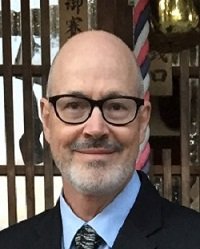教養学部報
第634号 ![]()
<駒場をあとに> LEAVING KOMABA
Roger Glenn Robins
 When I received notice that I should submit an essay on the theme of Leaving Komaba, I was not sure what I might possibly say. I did recognize, though, that something should probably be said. So here it is. My career at the University of Tokyo was not the usual career, however, so this is not the usual Leaving Komaba.
When I received notice that I should submit an essay on the theme of Leaving Komaba, I was not sure what I might possibly say. I did recognize, though, that something should probably be said. So here it is. My career at the University of Tokyo was not the usual career, however, so this is not the usual Leaving Komaba.
I had very little experience with true leaving in my early life. My first eighteen years were spent in the same American state, the same town, the same house. After that, the leaving never stopped. Perhaps the explanation lies in my being an American Baby-Boomer of a certain type. Leaving home for college, I gained lift from a coalition of spirits--the spirit of the 60's, the spirit of charismatic religion, the spirits of my migrating ancestors--and followed the wind "where it listeth." Looking back in hindsight, I discover, to my surprise, that Komaba has been the nearest thing to a home that I have had since childhood.
When I first arrived in Tokyo as a Fulbright Visiting Scholar in 2008, I did not intend to stay, but a concatenation of events unfolded near the end of my Fulbright year that changed the calculus. Through the agency of friends and good fortune, a place was found for me here at Komaba, and I will never forget the kindness that eased a foreigner into life in Japan. The chairs of the English Department--first Professor Katsuya Sugawara and then Masami Nakao--were unfailingly helpful, and a circle of other colleagues--Masako Notoji, Yujin Yaguchi, Nahoko Alvey-Miyamoto, Tom Gally, Shuichi Yatabe, Takane Ito, Clive Collins, Brendan Wilson, Sheila Hones, Yasuo Endo, Paul Rossiter, Toshiko Ellis, Jun Terasawa, Tsuneko Nakazawa, Yasunari Takada, and many others--aided in matters great and small. Accommodations were found for me in university housing near the campus, where I remain. Leaving Komaba, then, has a more comprehensive meaning for me than it might for others with a clearer separation of work and life.
Alongside warmth and collegiality, a steep learning curve greeted me. Courses had to be developed in all four skills of English language, and I stretched my expertise to craft upper division and later graduate courses that might be of use to affiliated departments and of interest to students. My tenure also overlapped with a period of evolving curriculum and dynamic new initiatives, including EfAS, ALESA, PEAK, GSP, and the term system, among others. I lent a hand where I could with the tools that I had available.
As a guest turned immigrant, there was (and is) always a sense of adventure, even wonderment, that turned daily life a little more than ordinary. But I found the ordinary, too. Komaba became a place to learn and grow, to raise a family, to tend a garden.
My career at Komaba, as I say, was not usual. I have been here only twelve years--scarcely a third of a full career, at most half--though longer than I have stayed anywhere else in my adult life. Now, once again, it's time to leave. Naturally, something should be said--a Leaving Komaba. I think of Mr. Sammler, the Saul Bellow protagonist pressed by the urgency of summary who hopes to distill history into dense epitomes that might be passed on to those who follow (culture being, or so he imagined, a precarious thing). As a veteran of many leavings, though, I've become too much the ritualist, weighting form above content, or too much the realist, doubting the distillation process. What, after all, are we doing with our Leaving Komabas?
Of course, we can only leave a place that we once were going to and arrived at. At one of the places I was going to and arrived at, I seem to recall being the minister of a small congregation in a small town where the faithful gathered in a wood-frame chapel, painted white, and I delivered sermons at an appointed hour, once a week. I came to realize that it was really not so important what I said. The important thing was that something be said by the given person at the given time in the given place. On that the tranquil motion of a small Copernican system rather depended.
Leaving is simply the backward-looking face of Janus, the god of beginnings, and so this is also my Going To. The eyes of the forward-looking face tend to widen at the promise of an unbounded future with its possibilities. That promise is always both true and false, since "freedom" reduces in actuality to an infinity of small particulars in the space between limits. In that respect, I suppose these big futures differ only in degree, not kind, from the mundane ones that unfold moment by moment and day by day.
As it turns out, I have no definite plans. All that is certain is that I will soon step out into where, in a sense, I've always been, where we always are--the space between.
The Space Between (Ohanami)
The distance between
splayed branch,
stone path,
is easily known,
but the petal will not fall
in a straight line.
(Center for Global Communication Strategies/English Language)
無断での転載、転用、複写を禁じます。

